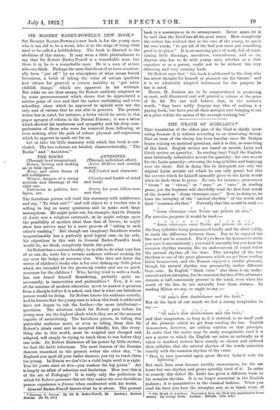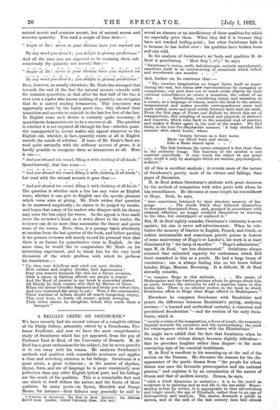THE WRATH OF ACHILLEUS.*
This translation of the oldest part of the Iliad is chiefly inter- esting because it is written according to an interesting theory. Part at least of the theory has been familiar since Mr. Bridges began writing on metrical questions, and it is this, or something of this kind. English metres are based on accent, Latin and Greek metres on quantity. In reading (say) Virgil the English- man habitually substitutes accent for quantity—his own accent for the Latin quantity—stressing the long syllables and hurrying over the short. But in doing this he disregards not only the original Latin accents (at which he can only guess) but also the accents which he himself normally gives to the Latin words when he finds them in prose. No one, for instance, pronounces " virum " as " virum," or " cano " as " cano " in reading prose, yet the beginner will cheerfully read the first four words of the Aeneid as "Anna virumque cano." Now, in doing so, he loses the interplay of the " natural rhythm " of the words and their " scansion rhythm." Naturally that line would be read CI I
Arma virumque cano Troia° qui prunus ab oris." For scansion purposes it would be read :- / o v / o o / // / / v o / / " Arms virumque cano Troiae que primus ab oris," the long syllables being pronounced loudly and the short softly, to mark the difference between them. But to be enjoyed the line need not be scanned. For if you know the hexameter metre you scan it unconsciously ; you read it naturally but you hear the scansion rhythm running like an undercurrent of sound below the natural rhythm all the time. This interplay of the two rhythms is one of the great pleasures which we get from reading Latin hexameters, and the Roman enjoyed a similar pleasure, though his natural rhythm was presumably rather different from ours. In English " blank verse " also there is an under- current and an interplay, for the scansion rhythm of five alternate stresses is half-consciously present to the mind, even when the words of the line do not naturally bear those stresses. In reading Milton we say, or ought to say :— / /
" Of man's first disobedience and tho fruit."
But at the back of our minds we feel a strong temptation to say. :—
/ V /to /
" Of man's first disobedience and the fruit," and that temptation, so long as it is resisted, is no small part of the pleasure which we get from reading the line. English hexameters, however, are seldom written on that principle. In order that the metre may be easily recognizable (and it is not a metre to which the English ear takes as naturally as it takes to iambics) writers have usually so chosen and ordered their syllables that the natural rhythm of the words coincides exactly with the scansion rhythm of the verse.
" Then to him answered again great Hector 'helm'd with the lightning."
But such lines soon become terribly monotonous, for the ear hears but one rhythm and grows speedily tired of it. In order to remedy this defect Mr. Ernie has given a different basis to his scansion rhythm. It is no longer accentual in the English fashion ; it is quantitative in the classical fashion. When you read his lines you hear the interplay not, as in blank verse, of • The Wrath of Achilleve. Translated from the Mad into quantitative hem.- meters. By George Finks. London =fond. [10a. net.] natural accent and scansion accent, but of natural accent and scansion quantity. You read a couple of lines thus :--
/ / /
" Augur of ills ! never in your lifetime have you rejoiced me
/ /
By any word you utter'd ; you delight in gloomy predictions."
And all the time you are expected to be scanning them sub- consciously (by quantity not accent) thus :— -- - 00— --- u u- " Augur of ills ! never in your lifetime have you rejoiced me .6 —V e-- u 0— — —U 0- By any word you utter'd ; you delight in gloomy predictions."
Here, however, as usually elsewhere, Mr. Ernie has arranged that towards the end of the line the natural accents coincide with the scansion quantities, so that after the first half of the lino is over even a reader who knows nothing of quantity can recognize that he is indeed reading hexameters. This concession was apparently made by the Latin poets too ; they allowed their quantities and accents to coincide in the last few feet of the line. In English some such device is certainly quite necessary, if quantitative hexameters are to be a success at all. The question is whether it is not required all through the line—whether quan- tity unsupported by accent makes aiiy appeal whatever to the English ear, whether, in fact, quantity exists at all in English outside the minds of scholars. If some of Mr. Ernle's lines are read quite naturally with the ordinary accents of prose, it is hardly possible to recognize them as hexameters at all. Here is one :- " And put aboard the vessel, filling it with clothing of all kinds. " Quantitatively, that line scans :— — u u u — o — — P And put aboard the vessel, filling it with clothing of all kinds " ; but read with the natural accents it goes thus :—
/
" And put aboard the vessel, filling it with clothing of all kinds."
The question is whether such a line has any value as English verse, whether it can give to English ears the specific pleasure which verse aims at giving. Mr. Ernie wishes that question to be answered empirically ; he claims to be judged by results, and hopes that many of his readers who disagree with his theory may none the less enjoy his verses. As the appeal is thus made (over the reviewer's head, as it were) direct to the reader, the reviewer can do no more than summarize the theory and quote some of the verses. Here, then, is a passage taken absolutely at random from the last quarter of the book, and before quoting it the present reviewer will merely record his personal view that there is no future for quantitative verse in English. At the same time, he would like to congratulate Mr. Ernie on his interesting experiment, and to thank him for the very lucid discussion of the whole problem with which he prefaces his translation :— " Up then rose Achilleus and cried out unto Atrides Most valiant and mighty Atrides, lord Agamemnon ! Pray you reserve business like this for a future occasion, After a pause in fighting affords our people a respite And the flood of passion in my heart is somewhat abated. All bloody lie their corpses who died by Hector of Ilium When the divine Cronides disgraced and broke you before him, And you command the army to eat ! Were I the commander, These warriors of Achaia should all march hungering, empty, This very hour, to battle till sunset—grimly avenging Their bitter shame by slaughter, before they made them a
banquet."











































 Previous page
Previous page